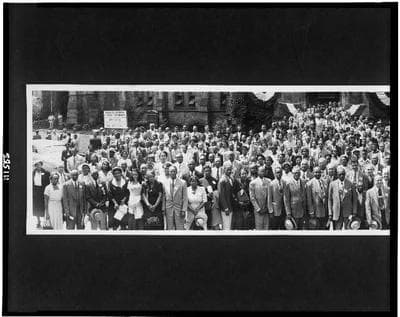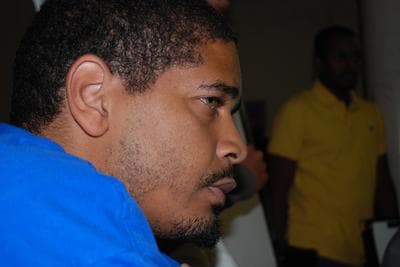Advertisement
Boston's Black Leaders Wonder If Community Has Lost Its Clout
Resume
Correction appended below.
According to the most recent census estimates, nearly one in every four Bostonians is black. Mayor Thomas Menino and challenger Michael Flaherty are courting black voters, but some wonder if black Boston is losing its political power.The National Association for the Advancement of Colored People was once the premier civil rights group in America. Boston had the first chapter and, in the 1960s, 5,000 people were in the organization. The NAACP led the fights against school segregation and housing discrimination in Boston, but now the group is a lot less outspoken, said member Sarah-Ann Shaw.
"I don't know why the NAACP doesn't have more of a voice, or more presence," Shaw said. "Years ago, it did."
Shaw is one of 400 members of Boston's NAACP. Back in the '70s and '80s, she said there were dozens of groups in Roxbury alone dedicated to political organizing. But some of the best organizers were the black clergy.
"The ministers were front and center," Shaw recalled. "They were united and front and center."
All the way into the 1980s, black ministers used to protest outside City Hall and educate parishioners in the pews about issues and candidates.
Pastor Bruce Wall led some of those protests, but now, "the ministers are so dependent upon the government for faith-based grants, for property, for little things that the government is giving them," Wall said. "The ministers are not independent to speak their minds." Without activist pastors, Wall worries that Boston's blacks are losing their "political potency."
Some think they already have.

Activist Horace Small is trying to organize black people to demand better public schools. He said Boston's blacks missed an opportunity with this mayoral race.
"We don't have any clout," Small said. "For instance, we have four guys running for mayor, and none of us had enough sense to say, OK, none of these cats become mayor unless the black community votes."
But what is the black community in Boston? The most recent census shows that the overall black population is shrinking in Boston. While African-Americans have been leaving the city, they are being replaced by Haitians, Dominicans and Somalis, but not at the same pace.
Small said no one has figured out how to integrate immigrant interests into a unified black agenda. But there is common ground.
"We know, because we're talking to them on public education issues, that housing is an issue with them, just like it's an issue with us," Small said. "Health care is an issue with them, just like it's an issue with us; unemployment is an issue with them, just like it is with us."
Finding this common ground could help blacks in Boston have political clout, said Simone Miles, who helped start a group called Think Politics to educate voters and encourage black candidates to run for office. The problem, she said, is complacency.
"People have gotten a little numb," Miles said. "They think racism is not overtly in my face, so everything is OK. But it's worse. When a kid is not being educated and then expected to be an adult and then held accountable for things he didn't learn as a child, it's worse. But again, since it's not so blatant and overt, some people have gotten numb."
Don't get the wrong idea. Blacks in Boston are voting. Black neighborhoods had an average turnout in the preliminary mayor's race, but Miles said that's not good enough.
Candidates are talking about issues important to blacks. Mayor Menino has high approval ratings among blacks because he has helped bring development to black neighborhoods. Michael Flaherty has talked about improving failing schools.
But activist Horace Small said black people in Boston still to have to pressure these candidates to meet the black agenda.
"Michael Flaherty is a personal friend of mine. I like Mike. But I don't know which Mike is running for office," Small said. "I don't know if this is the guy who's to the right of Louise Day Hicks or to the left of Gandhi. I remember when he was president of the City Council and would stop conversation on things that impact people and, in particular, people of color. Who are you bro?"
"And the same thing with Mayor Menino!" Small continued. "Fourteen-hundred kids have been killed since you been mayor. If we're empowered, we got a right to ask that question. We got a right."
But figuring out who the "we" is in that sentence and getting them to speak with one voice is now the challenge for blacks in Boston.
Correction: The story misrepresented the number of people killed in Boston since Mayor Tom Menino became mayor. According to city statistics, more than 1,000 people--including children and adults--have been killed in homicides since 1992 when Menino took office.
This program aired on October 6, 2009.